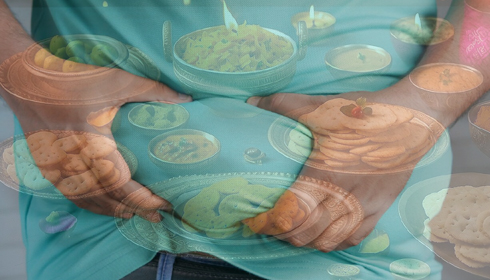
Diwali revelry ignites rising obesity worries across India
Diwali, the much-anticipated festival of lights in India, is a time of immense joy, family gatherings, delectable cuisine, and the exchange of heartfelt gifts. Yet, amidst the festive fervour, a concerning issue looms large: the unintentional contribution of Diwali celebrations to India's escalating obesity problem.
Diwali, known as the "Festival of Light," holds a special place in the hearts of millions across the nation. It's a time for reuniting with loved ones, indulging in sumptuous feasts, and cherishing cherished traditions. However, these festivities, marked by an exchange of sweets and snacks among family and friends, have inadvertently played a role in the country's obesity epidemic.
At the core of Diwali traditions lies the exchange of delectable sweets and snacks. This celebratory season is closely intertwined with calorie-rich delicacies, ranging from irresistible jalebis to an assortment of deep-fried treats. To put it into perspective, just two laddoos can pack a staggering 307 calories, while a single piece of Rasmalai carries a hefty 331 calories—an amount that can significantly derail even the most well-intentioned healthy diet plan.
As India grapples with rising obesity rates, which is fast reaching a crisis point triggering multiple health concerns, Diwali's unintentional contribution to this issue underscores the importance of mindful eating during the festive season. With the festival's emphasis on sharing and indulgence, experts are urging individuals to savour the celebrations responsibly, making choices that align with a balanced and health-conscious lifestyle.
According to the World Health Organisation (WHO), obesity and overweight are conditions associated with excessive body fat accumulation. Body Mass Index (a measure of a person’s weight divided by their height) over 25 is classified as overweight, and Body Mass Index (BMI) over 30 is classified as obese.
As per the WHO report, approximately 1.9 million adults (aged 18 and over) are overweight, while more than 650 million people are obese around the world.
A study published in Diabetes and Metabolic Syndrome reported that obesity affects 135 million people in India. In the study, researchers stated, “According to the ICMR-INDIAB study 2015, the prevalence rate of obesity and central obesity varies from 11.8% to 31.3% and 16.9% to 36.3%, respectively. In India, abdominal obesity is one of the major risk factors for cardiovascular disease (CVD). Various studies have shown that the prevalence of obesity among women is significantly higher as compared to men."
The prevalence of obesity and its related conditions like cardiovascular diseases, diabetes, etc. is particularly high in developing countries like India due to the consumption of high-calorie foods and altered lifestyles.
In a report published by the National Institute of Diabetes and Digestive and Kidney Disease, researchers say that obesity and overweight conditions increase the risk of developing noncommunicable diseases like heart disease, including hypertension, stroke, metabolic syndrome, type 2 diabetes mellitus, renal impairment, osteoarthritis, and gout.
Furthermore, cancer, pregnancy issues, respiratory diseases like asthma, and fatty liver diseases are also significantly associated with obesity and overweight.
Speaking to the Drug Today Medical Times, Mumbai based physiotherapist and physio consultant, Dr Ashwini Wakde said, "It is not that difficult to manage the extra calories during festivals. A healthy diet plan can help you enjoy healthy food. In particular, during Diwali, you have to avoid maida (all-purpose flour)-containing food products. Additionally, exercising can be beneficial in reducing weight.”
Commenting on the obesity problem, he added, "Cardio or aerobic exercises like walking, running, and cycling can assist obese patients in reducing and maintaining weight.”
The festive season also disturbed the regular exercise routine, as individuals got engaged in social activities and preferred to stay indoors, which can result in weight gain. To reduce the increasing prevalence of obesity, it is essential for individuals to enjoy the festival in a healthy and balanced manner. Experts suggest achieving this by consuming healthy food and integrating physical activities into the holiday season.
In the end, health experts advise people prioritise their health amidst the joy and festivities of Diwali.